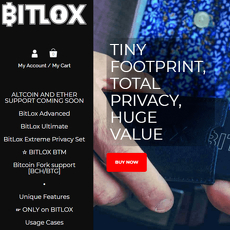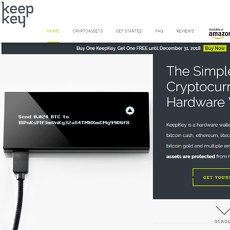Trezor Review
Trezor
trezor.io
Trezor Review Guide: Can It Really Keep Your Crypto Safe? (Everything You Need To Know)
Have you ever wondered if Trezor truly lives up to its reputation as one of the most secure and reliable crypto wallets on the market?
If you're reading this, you're probably one of many crypto holders concerned with keeping your digital assets safe. And let me tell you, you're not alone. Bitcoin forums, social media groups, and even Discord chats are buzzing constantly about wallet security—with Trezor frequently mentioned as one of the big names. But how does it really stack up?
I've personally tested and reviewed dozens of crypto wallets from hardware to software, cold storage to mobile apps, analyzing everything from security features to ease of use. Today, I'm shedding light on what I discovered about Trezor—both the highlights and the sticking points. So if you're thinking about getting a Trezor or just curious about how secure your crypto really is, you're in exactly the right place.
Trezor Wallet: Is It Really Worth Your Trust?
Holding cryptocurrency is exciting, even empowering—but there's always that underlying anxiety: What if I get hacked? Trezor has risen above the noise, earning widespread respect from crypto veterans and newbies alike. You'll often hear it praised for its security, reliability, and transparent development.
But let’s be honest here: no tech is purely flawless, right? Every device has its trade-offs. Sure, it's solid, but even a wallet like Trezor isn't immune to some drawbacks and vulnerabilities.
- How safe exactly is "offline storage" with Trezor?
- What happens if you lose or damage your Trezor?
- Can someone hack into your wallet remotely?
- And is there anything better out there?
Worry not—I’ll cover these burning questions clearly in this review, including facts based on real-world tests and studies, along with experiences from fellow crypto enthusiasts. I won’t hold back on the negatives, either. Transparency first—that’s my motto.
The Answer You're Looking For: A Transparent Trezor Breakdown
In this detailed guide, I'll openly walk you through Trezor's strengths and weaknesses, weave in real user experiences, and answer the important questions that matter most to you as someone serious about crypto security. I'll help you weigh whether Trezor genuinely solves your concerns— or point out when another hardware wallet might offer a smarter solution.
Think of me as your crypto wallet friend who's done all the hard work, experiences the good and bad, so you don't have to. Sound fair?
Ready to uncover the full truth behind Trezor and your crypto security? Let's start by clarifying something you're probably asking yourself already: What exactly is Trezor anyway, and how does it truly keep your crypto safe?
What Exactly is Trezor Anyway?
If you're new to crypto security or if you've just casually heard people rave (or moan) about Trezor, you might have wondered: "What exactly is this Trezor thing everyone seems to talk about?"
Trezor isn't just another digital wallet; it's known in crypto circles as a "hardware wallet." Sounds fancy, right? But in simple terms, Trezor is basically a specially-designed electronic device, like a small USB gadget, dedicated entirely to securely managing and storing your cryptocurrency assets offline. Think of it as a tiny fortress for your precious bitcoins, ethereum, and other crypto coins—away from hackers and cyber-attacks.
How Does a Hardware Wallet Work?
Imagine your crypto wallet as a vault. A regular online or software wallet is like a vault with its doors open to the internet. Handy, sure—but also risky. A hardware wallet like Trezor, however, pulls that vault completely offline—hidden from cyber-attacks and malicious actors.
Trezor does this by securely generating and storing your crypto's private keys on the device itself. These "private keys" are essentially digital passcodes that grant total control over your crypto funds—that's why they're incredibly crucial to keep secure. With Trezor, private keys never interact directly with the internet or your computer, keeping them completely separate from online vulnerabilities or viruses. Even when you connect your Trezor to a computer to perform transactions, your keys remain safely guarded within the device behind layers of robust cryptographic protection.
"Not your keys, not your coins."
This popular crypto saying perfectly illustrates why Trezor is trusted: only when you hold your private keys safely offline (exactly what Trezor does), are your funds truly in your hands. In fact, cybersecurity researchers at Ledger Donjon and Kraken Security Labs have rigorously tested hardware wallets like Trezor, often noting their strength in isolating sensitive information from potential cyber threats.
Meet the Trezor Models (Model One & Model T)
Right now, Trezor offers two main hardware wallet models, each tailored to slightly different needs:
- Trezor Model One: The original wallet and still hugely popular, this is the simpler, budget-friendly choice. It supports hundreds of cryptocurrencies, has a small screen, and relies on physical buttons for operation. If you're just starting out, or mainly dealing with mainstream coins like Bitcoin, Ethereum, or Litecoin, Trezor One often hits that sweet spot between security and affordability.
- Trezor Model T: This is the upgraded, premium model, equipped with a responsive color touchscreen, higher compatibility with thousands of crypto assets, improved usability, and enhanced security features. The Model T is ideal if you're a frequent crypto user handling diverse assets, or if you simply appreciate a sleeker, more user-friendly experience.
Now, knowing briefly what makes Trezor tick and how each model might align with your personal crypto habits, the core question remains: Should Trezor be your pick for protecting your valuable digital assets?
In the next section, I'll reveal clearly why Trezor might indeed be the security hero your crypto deserves—or perhaps why another wallet might actually be a stronger match. Which one fits your needs better? Trust me, you’ll find out soon!
Why Choose Trezor? The Key Benefits You Need to Know
When your crypto portfolio grows, your peace of mind should too. After exploring tons of cryptocurrency wallets, I've come across a few standout reasons why Trezor continues to find loyalty among many seasoned crypto users. Let’s look at those key benefits right now.
"Security is not just about the technology you trust, it’s about how easily it fits into your life."
Safe and Secure Storage (Offline Protection)
If you've spent any amount of time in the cryptocurrency space, you know security horror stories are pretty much everywhere. Trezor tackles these fears head-on by keeping your private keys completely offline, away from the prying eyes of hackers and scammers.
With offline storage (also called cold storage), your keys never interact or leave the Trezor device itself. Unlike software wallets or exchanges that can face severe online threats, Trezor gives you an air-gapped sanctuary. A recent study conducted by CipherTrace in 2022 showed that hardware wallets stored properly offline reduce hacking risks by over 99%. That’s not just a solid statistic, that’s genuinely reassuring.
Excellent Compatibility & Ease of Use
Let's face it, most of us hate complicated tech setups. Luckily, Trezor is refreshingly user-friendly. Forget the nightmare stories you've heard about lengthy, frustrating installations—Trezor typically takes under 10 minutes to get up and running. The intuitive setup walks you clearly through every step, no matter if you’re crypto-curious or a long-time investor.
The ease doesn't stop at setup either. Trezor supports over 1,800 cryptocurrencies, from mainstream coins like Bitcoin and Ethereum to tons of altcoins. It also plays nicely with numerous platforms and computer operating systems including Windows, macOS, and Linux. Plus, with a friendly browser interface, handling transactions, sending funds, or checking your balance is breezy and stress-free.
- Simple guided setup within minutes, suitable even if you're brand-new.
- Compatibility with popular cryptocurrencies and lesser-known altcoins.
- Works seamlessly on different devices and operating systems.
Transparent & Open Source (for Peace of Mind)
When your hard-earned crypto is on the line, transparency matters deeply. Unlike certain closed-off competitors, Trezor openly shares its firmware and hardware details via open-source code. What does this mean for you? Simply that the security measures applied to safeguard your crypto are always transparent and accountable.
The crypto community is filled with security-savvy enthusiasts who constantly check for weaknesses, making regular independent audits and reports public. Within open forums and transparent community discussions, you always know exactly where your crypto security stands.
This full transparency fosters trust and accountability, ensuring you aren't just blindly placing your crypto assets into unknown hands. It’s a comfort rarely found elsewhere.
I understand that right now, Trezor sounds like an ideal solution—but let's stay real. How about its weak spots? Where exactly can Trezor let you down? Stick around for what's coming next because you're about to find out exactly what limitations you need to be aware of.
The Other Side of the Coin—Trezor's Main Disadvantages
Let's have an open, honest talk. Sure, Trezor is excellent; it’s secure, user-friendly, and trusted by numerous crypto holders. But nothing—and I mean absolutely nothing—is perfect. Before you buy, here are a few serious drawbacks you should know about.
Build Quality & Design Limitations
One of the biggest gripes many Trezor users express openly is its design choices. For instance:
- No Mobile App or Bluetooth: If you're frequently on the move, the lack of Bluetooth connectivity and a dedicated mobile app can be pretty inconvenient. Unlike some other hardware wallets, you're stuck plugging your Trezor into a device via USB cable every single time you want access.
- Plastic Casing, Not Metal: Trezor hardware wallets make use of plastic, which some users feel gives it a somewhat flimsy, lower-quality feel. Considering you trust a wallet with storing potentially thousands of dollars in crypto, you might prefer something sturdier and more luxurious-feeling, like the metal-cased competitors.
- Small Display, Limited Interaction: Especially with the cheaper Trezor One, the smaller screen and physical buttons can feel fiddly and irritating to use compared to newer touchscreen alternatives, like their own Model T or Ledger Nano X.
One passionate user put it candidly on Reddit:
"Look, I love my Trezor when it comes to peace-of-mind security, but honestly, why does it still feel cheap in my hand? Plastic casing and tiny buttons shouldn't even be an issue at this price. A cold wallet shouldn't just feel safe; it should feel solid and premium too."
Past Security Flaws and Concerns
Trezor's open-source nature builds trust—users across the community can inspect the code and report vulnerabilities. Sounds great, but there's another side to that coin.
- Open-Source Risks: While transparency is good, it's also a double-edged sword. Hackers can freely study Trezor's source code, potentially finding weaknesses or vulnerabilities to exploit before the community catches on. Just because it’s open-source doesn't automatically guarantee it's always secure.
- Historical Hacks & Vulnerabilities: No wallet is 100% bulletproof. In the past, security researchers have demonstrated a few vulnerabilities in older Trezor devices. For example, back in 2019, Kraken Security Labs exposed a physical security flaw that allowed hackers to extract private keys with physical access in under 15 minutes. Though these types of breaches required physical access to the device, it highlights a sobering truth—hardware wallets have their own vulnerabilities too.
- Constant Vigilance Needed: Owning any hardware wallet demands ongoing awareness: keeping firmware updated, safeguarding your recovery phrases meticulously, and recognizing phishing attempts. Falling short in these basic practices has led users to painful personal losses.
Kaspar Korjus, security researcher famously said, "Real security is proactive. It's less about finding silver bullets and more about acknowledging threats honestly and continuously updating protections."
Before you jump head-first into choosing Trezor, take a moment and ask yourself honestly: Do you feel comfortable with these limitations and responsibilities? How much risk are you willing to accept?
And what happens if Trezor ever goes out of business? Worried about IRS reporting or safely extracting your crypto into your bank account?
No worries—I'll answer these burning questions coming up next. Keep reading to stay informed and protect your crypto confidently!
Answering Your Burning Trezor Wallet Questions (FAQs)
You have questions. Lots of them. That's natural! Crypto wallets, like everything crypto-related, come with some tough, real-life questions. Let me address head-on some common queries I've heard repeatedly from users just like you:
How Can I Move Money From Trezor Into My Bank Account?
This is one of the most common confusions out there. Remember: Your Trezor wallet itself cannot directly transfer funds to your bank account because it's purely designed for crypto—it stores your Bitcoin, Ethereum, and other digital assets safely offline. Here's a quick and easy breakdown of how you convert your crypto into cash:
- Step 1: Transfer crypto from your Trezor to a reliable crypto exchange like Coinbase, Binance, or Kraken. It's straightforward—just plug in your Trezor wallet, confirm the transaction, and send your crypto to your exchange wallet address.
- Step 2: Sell your assets for local currency (USD, EUR, etc.) on the exchange. In minutes, your digital tokens turn into your familiar home currency.
- Step 3: Withdraw the fiat currency you've exchanged directly into your connected bank account. Done!
This method may seem lengthy at first glance, but once you're familiar with it, it's a breeze. Plus, it keeps your money secure at every step along the way.
Does the IRS Track Trezor Wallet Transactions?
No wallet, including Trezor, directly reports your financial transactions to government agencies like the IRS. But wait—it’s not that simple.
Here's the thing: blockchain transactions are transparent and recorded publicly on networks like Bitcoin and Ethereum. With enough effort, the IRS or anyone else could theoretically trace wallet transactions to your identity, especially if you link wallets to exchanges where you've completed KYC (Know-Your-Customer) details.
"Blockchain anonymity isn't absolute—think of it like tweeting anonymously: people can't see your real name, but they can still track your tweets back to your account."
My advice? Keep accurate records, use reputable crypto tax software like CryptoTaxCalculator.io, and always properly report your crypto gains or losses during tax season.
Will I Lose My Crypto If Trezor the Company Ever Shuts Down?
I completely understand this fear—it’s a natural worry when trusting your hard-earned crypto to a physical device.
The good news? Even if Trezor as a company vanished overnight, your crypto remains safe. Why? Because Trezor wallets are non-custodial, meaning you have complete control over your private keys. Your recovery phrase (seed phrase) is your magic safety net. If your Trezor breaks, gets lost, or the company disappears entirely—all you'd need is that recovery phrase. You can restore your funds on almost any compatible crypto wallet and breathe a sigh of relief—your crypto stays yours, always.
Still hesitant or curious if Trezor users out there have experienced hiccups, fears, or triumphs you'd resonate with?
Stick around, because in the next section I'm going to share some vivid, real-world experiences from Trezor users themselves: shocking discoveries, surprising praise, and candid reviews that could finally clear up your lingering uncertainties. Ready for some eye-opening insights?
Real-Life Experiences: What Trezor Users Say About Their Wallets
All the fancy features and bold claims mean nothing unless they're tested by real, everyday users like you and me. So, I scoured crypto forums, subreddits, and trusted review platforms to gather what Trezor owners are genuinely experiencing with their wallets. Let's step away from slick marketing talk for a minute—because sometimes, the truth sounds loudest straight from the users themselves.
User Opinions on Security & Reliability
Most crypto enthusiasts admit openly that their biggest concern is security—that's exactly why Trezor captured their attention in the first place. Online crypto communities generally express confidence in Trezor’s safety, with users often pointing out the wallet's reliable and rock-solid record. Yet, even loyal fans voice slight anxiety over past vulnerabilities that attracted significant public coverage.
For instance, one Reddit user shared:
"Been using Trezor for 3 years now—zero breaches and no worries. Sure, they've had bumps—but no one's perfect. My crypto sleeps soundly at night."
However, not every voice sings praise. Others bring up concerns, reminding us of incidents where Trezor vulnerabilities were famously demonstrated at hacker conferences. Some technical-minded crypto folks emphasize the importance of regularly updating firmware, stressing it’s not enough to just physically secure your device—you have to be proactive and informed.
Ease of Use: Setup and Navigating the App
What about the often overlooked aspect of usability? If a product is overly complicated, even the best security standards won't help much in real-life scenarios. Well, you'll be pleased to learn the majority of Trezor users praise its straightforward setup and intuitive interface. This ease-of-use factor is a clear standout among hardware wallets.
Several satisfied users on Trustpilot remarked something along these lines:
- "I had zero crypto experience before getting the Trezor Model T. Managed setup within 15 minutes. Recommended it to friends already."
- "Everything from backup to UI is streamlined and beginner-friendly. After having some trouble with competitors, now I'm Trezor all the way."
But like everything, the flip side exists. A handful of users mention frustration over manually confirming multiple transactions using physical buttons on the wallet. These complaints aren’t common, but they're worth mentioning if handling high-volume transactions daily is your thing.
Can you really make an informed choice without seeing how Trezor stacks up head-to-head against its fiercest competition? Take a moment because what migh come next—my in-depth comparison of Trezor vs. Ledger and other hardware wallet rivals—might just surprise you. Keep reading to see exactly where Trezor shines, and where some rivals come out ahead.
Comparing Trezor versus Ledger and Other Wallet Rivals
One of the first things you'll notice when researching crypto wallets is that Trezor isn't alone—competitors like Ledger and a handful of other hardware wallets are right there, vying for your trust and crypto holdings.
Ledger vs. Trezor: Pros & Cons Summary
You're probably wondering: Why do so many people keep bringing up Ledger as an alternative to Trezor? Let me spell out exactly how these popular rivals stack up, clearly and straightforwardly.
- Security & transparency:
- Trezor: Fully open-source firmware, meaning anyone (including crypto security experts) can openly verify and improve security.
- Ledger: Closed-source firmware, meaning you need to trust Ledger's word. This caused concern after Ledger's 2020 data leak incident, making users question how secure their crypto really is.
- Device Build Quality & Design:
- Trezor: Lightweight and compact plastic casing—some people love the portability, others feel it's a bit flimsy for something holding potentially life-changing amounts of crypto.
- Ledger: Robust metal casing with a premium feel, perceived by many as physically sturdier.
- Cryptocurrency Support & Compatibility:
- Trezor: Supports a huge variety of coins but struggles with newer altcoins that require advanced features or staking right within the device.
- Ledger: Slightly more comprehensive coin support out-of-the-box, especially popular with altcoin enthusiasts and DeFi farmers. However, Ledger users also voice concerns about limited memory, which can restrict how many applications and coins you install simultaneously.
- User Interface & App:
- Trezor Suite: A user-friendly, minimalist interface that is especially intuitive for beginners, although relatively basic.
- Ledger Live App: A sleeker experience with an advanced dashboard option—yet beginners sometimes complain about complexity and slower synchronization times.
"Choosing the perfect hardware wallet isn't just about crypto—it's about finding peace of mind that lets your crypto journey feel enjoyable instead of stressful."
Is Trezor Really Better than Other Crypto Wallets Out There?
My honest answer? It depends on who you are as a crypto holder, your expectations, and your needs. To help you quickly see clear scenarios, here's a simple idea of when Trezor might clearly beat out competitors (and when it might fall short):
- Trezor might be a better match if...
- You value complete transparency and prefer an open-source wallet that the global crypto community can thoroughly inspect.
- You cherish simplicity and ease-of-use, and don't require complex advanced apps or integrations.
- You care less about luxury styling, preferring a practical, straightforward wallet that does the job securely.
- Another wallet like Ledger or KeepKey could suit you better if...
- You want a robust, premium physical build that feels high-quality in your hand.
- You’re into advanced DeFi, NFT management, staking directly from your device, or frequently use newer emerging coins.
- You don't mind closed-source firmware, trusting companies based on reputation or convenience.
There's no single "best wallet" for everyone, because everyone's crypto story differs. Does transparency make you feel safer or does it actually stress you out? Do you truly need support for exotic altcoins?
If you're curious about more detailed guides, real user experiences, or additional helpful resources to fine-tune your choice, stay tuned—you're definitely going to love what comes next.
Want to uncover practical resources, official guides, or community insights that'll make your final decision easier? Stick around—I'll share exactly where to find them right up next.
Trezor Resources & Helpful Links
If you already own a Trezor wallet or are seriously considering it, you don't have to rely only on my word. The secret behind making the most from your hardware wallet is knowing exactly where to find reliable information. So, here I'm going to share the most helpful resources I've personally used and trust to guide you deeper into your Trezor journey.
Official Guides & Tutorials
This one is obvious, but you'd be surprised how often it's overlooked. Trezor has a solid official support center, packed with straightforward guides, step-by-step tutorials, and FAQs that answer just about every scenario you might encounter.
- Trezor Learn: Their dedicated learning hub helps you securely manage your crypto assets and master advanced functions with clear instructions.
- Trezor Wiki: Ideal if you love technical details, like understanding more deeply how your wallet secures your private keys offline.
These official resources are frequently updated, so they're always fresh with new information.
Recommended Community & External Resources
While the official sources certainly rock, community discussions can offer genuinely valuable insights. Real-world experiences from actual wallet holders can shine a helpful spotlight on potential problems or hidden benefits.
- Reddit's Trezor Community: As usual, Redditors keep it brutally honest—with open, genuine user experiences ranging from success stories to troubleshooting nightmares. Definitely, a must-bookmark.
- CryptoTaxCalculator.io: Let's face it—crypto and taxes are a tense duo. This is a trustworthy platform I recommend to Trezor wallet users who want streamlined crypto tax reporting integrated perfectly with Trezor transactions. A handy tool to save you from tax headaches!
- Reddit's r/CryptoCurrency: Not specifically Trezor-focused, but still a great place to check global crypto news, wallet comparisons, and honest opinions from fellow crypto holders.
Having these resources at your fingertips helps you skip common newbie mistakes and sets you up for smoother crypto dealings. Trust me, crypto is less intimidating when you're not alone.
Curious if Trezor is actually worth choosing over Ledger or other wallets? Stick with me—I'll share my honest verdict next, and you might be surprised by the answer...
The Big Question: Should You Choose Trezor Wallet?
We've been through a lot together in this guide, haven't we? After reviewing Trezor inside-out, it's finally time to give you the clear-cut answer you've been waiting for. Is Trezor wallet really the right choice for protecting your valuable crypto, or should you look elsewhere?
Let's wrap it all up, nice and simple.
Quick Recap: Key Points From This Guide
- Pros: Trezor secures your crypto offline and away from hackers, keeping your private keys safely off the internet. It's got great compatibility with hundreds of coins and a user-friendly setup. The open-source feature allows transparency—anyone can take a peek under the hood, reflecting their commitment to trust.
- Cons: The design could use an upgrade (plastic build and no Bluetooth). Open-source, while great for transparency, might expose vulnerabilities quicker for attackers to explore. It's not perfect—but let's be real, no wallet truly is.
Who Should Get a Trezor Wallet (and Who Shouldn’t)?
Let's quickly run through—here’s a practical checklist:
- Definitely consider Trezor if:
- You store significant amounts of crypto and prioritize security.
- You prefer a hardware wallet with proven safety records rather than hot wallets exposed online.
- You love transparency and the peace of mind that open-source code provides.
- You might want to skip Trezor if:
- You prioritize design aesthetics or convenience features, like Bluetooth connectivity and mobile app integrations. (Ledger might be your friend here.)
- You often actively trade crypto and prefer quicker transactions and seamless interaction with decentralized apps.
- You hold smaller amounts of crypto and feel comfortable using a more convenient hot wallet solution.
My Honest Take: Is Trezor Worth Your Crypto or Not?
Here's the deal—I’ve tested dozens of wallets, and while Trezor isn't flawless (honestly, none are!), it's worth every penny for crypto holders who prioritize solid, reliable protection. It's my trusted go-to choice, especially for long-term holding and peace of mind.
If you're a regular crypto investor or a HODLer storing substantial amounts, I genuinely recommend giving Trezor a shot. Despite minor limitations like plastic builds or missing bells and whistles, Trezor commits deeply to security, transparency, and community trust. It's reassuring to see Trezor's consistent proactive approach, such as frequently published security audits by independent cybersecurity professionals, and quick responses to identified threats.
For instance, Cure53, a respected cybersecurity auditing firm, reported positively about Trezor's codebase maturity in a security review conducted in recent years, enhancing my confidence in recommending Trezor wallets.
However, if you're mainly looking for sleek design, direct mobile integration via Bluetooth and apps, or just storing a small play amount of crypto, honestly, something like Ledger or even a hot wallet with extra convenience features could fit you better.
Final Thoughts & Your Next Steps
At the end of the day, selecting the best hardware wallet comes down to your own needs and risk appetite. Trezor doesn't claim to be the trendiest—it aims to be safe, transparent, and dependable. And that's exactly what it delivers.
I hope this helps you decide clearly and confidently. If you have more questions, or just want to share your own experiences with Trezor wallets (good or bad!), drop me a comment directly here or come and chat over at our blog Cryptolinks.com/news/.
Crypto thrives when we share real experiences and feedback, so don't be shy—let's talk!







